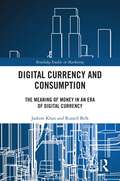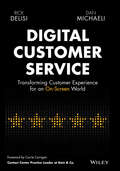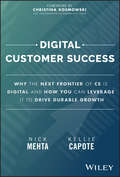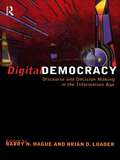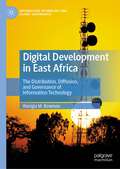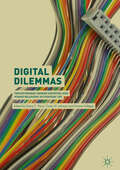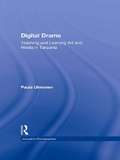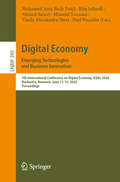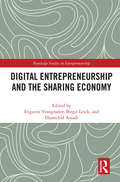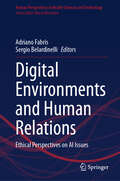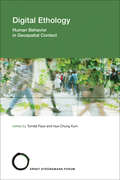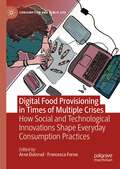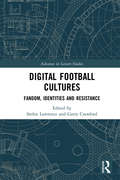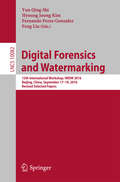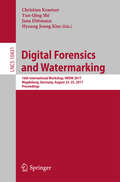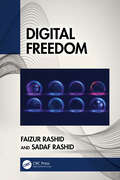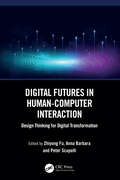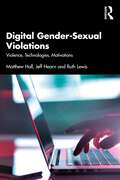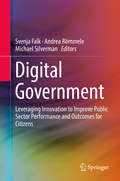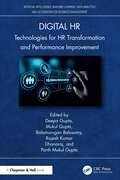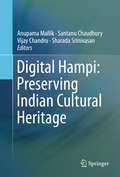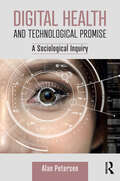- Table View
- List View
Digital Currency and Consumption: The Meaning of Money in an Era of Digital Currency (Routledge Studies in Marketing)
by Jashim Khan Russell BelkThe digitalization of payment modes, combined with the development of Blockchain technology, is shaping the future of digital currency worldwide. Many financial regulators are experimenting with the feasibility of digital currencies nationally in a variety of forms, such as cryptocurrency, virtual currency and central bank digital currency. These digital currencies are just some of those discussed in this book. Each facilitates a transaction efficiently and will likely open an alternative payment system, possibly leading to a global digital currency.This book will present and highlight a broad view of digital currency in the era of globalization. This book will address the meaning of money in a global world. By going beyond fungible national fiat-based currencies to global cryptocurrency and stablecoins, virtual currencies promise to disintermediate and decentralize money. The digital currencies that are the focus of this book use the internet for transactions and harbor the potential to make a unified digital currency system across the globe. This book explores the role of digital currency in influencing consumer behavior, from spending or saving to gaming, tipping and gambling. It asks what is the future of digital currency and what is its role in facilitating and transforming the future of the metaverse?Digital Currency and Consumption will be useful reading for a postgraduate audience to understand how digital currencies are shaping the digitalization of transactions and behavior of consumer citizens. It will be of value to researchers interested in a wide variety of disciplines, including international business, finance and consumer behavior.
Digital Customer Service: Transforming Customer Experience for an On-Screen World
by Rick DeLisi Dan MichaeliDigital Customer Service is the new standard for creating a 5-star customer experience As much as technology has improved our lives, for many people customer service experiences remain unnecessarily frustrating. But the advent of Digital Customer Service (DCS) promises to make these interactions seamless and effortless by creating experiences that occur entirely on a customer's own screen, even in situations where it is preferable to speak to an agent. Digital Customer Service: Transforming Customer Experience for an On-Screen World traces the evolution of customer service—as well as the evolution of customer expectations and the underlying psychology that drives customer behavior - from the days of the first call centers in the 1980s all the way to today's digital world. Written for Customer Service and Customer Experience leaders as well as C-suite executives (CEOs, CFOs, CIOs), Digital Customer Service helps business leaders balance three critical priorities: Creating an excellent experience for customers that increases customer loyalty and profitability Driving down the cost of Customer Service/Support interactions, while increasing revenue through Sales interactions Moving quickly toward the goal of "digital transformation" We have discovered—in our research and our first-hand experience—that when companies commit to achieving true Digital Customer Service, they can make significant progress toward all three of these goals at once. Digital Customer Service provides the roadmap for how your company can get there. And when you do, who wins? EVERYONE.
Digital Customer Success: Why the Next Frontier of CS is Digital and How You Can Leverage it to Drive Durable Growth
by Nick Mehta Kellie CapoteAutomate your Customer Success efforts to reduce churn and increase profits In Digital Customer Success: The Next Frontier, a team of trailblazing Customer Success professionals and digital entrepreneurs delivers an insightful discussion of the next stage in Customer Success management. In the book, you'll discover how to design and deploy touchless and automated digital interventions that help your software users learn and grow as they use your product and unlock the value trapped within it — without ever needing to reach out to a live Customer Success Manager. The authors provide a detailed “How-To” guide to Digital Customer Success that explains how you can meet the needs of your customers, investors, and team members. You'll explore the basics of the authors' original Digital Customer Success Maturity Model and the core tenets of how to get started. After that, you'll find: Explanations of the ideal organizational structures to enable Digital Customer Success management Case studies and examples from real companies blazing new trails in Customer Success Critical success measurements and metrics you can use to determine if your company is on the right track or if it needs to reorient Perfect for managers, executives, directors, founders, entrepreneurs, and other business leaders involved in the sale of digital and software products, Digital Customer Success is also a can't-miss resource for Customer Success professionals, sales leaders, marketers, product development professionals, and anyone else with a stake in reducing customer churn and increasing revenues.
Digital Democracy: Discourse and Decision Making in the Information Age
by Brian D. Loader Barry N. HagueDigital Democracy considers how technological developments might combine with underlying social, economic and political conditions to produce new vehicles for democratic practice.The growth of new Information and Communication Technologies (ICTs) such as the Internet, alongside growing concerns about the failure of advanced societies to live up to the democratic idea, has produced much interest in the prospects for a digital democracy.This book will provide invaluable reading for those studying social policy, politics and sociology as well as for policy analysts, social scientists and computer scientists.
Digital Development in East Africa: The Distribution, Diffusion, and Governance of Information Technology (Information Technology and Global Governance)
by Warigia M. BowmanThis book uses comparative case study methodology and extensive field work to examine and compare outcomes of four East African nations (Kenya, Tanzania, Uganda, and Rwanda) that implemented formal Information and Communications Technology policies in the 1990s. Based on extensive fieldwork, the book assesses the emergence of a new policy and technological arena from the turn of the millennium to the present. In addition to tracing the implementation and reception of these policies, Bowman considers to what extent the politics of infrastructure in four connected but distinct African nations have resulted in global participation and equitable distribution and access of infrastructure to all citizens, as well as the impact a recent history of war or peace have on the technological outcomes in these communities. The book provides us with invaluable new data on how policy and politics function in emerging democracies, and illuminates long-overlooked opportunities and conditions necessary for the distribution of new and potentially beneficial technologies in other developing countries.
Digital Dilemmas: Transforming Gender Identities and Power Relations in Everyday Life
by Simone Fullagar Diana C. Parry Corey W. JohnsonThe proliferation of digital technologies, virtual spaces, and new forms of engagement raise key questions about the changing nature of gender relations and identities within democratic societies. This book offers a unique collection of chapters that brings together scholars from diverse backgrounds to explore how gender experiences and identities are being transformed by digital technologies in ways that affirm or deny social justice.
Digital Drama: Teaching and Learning Art and Media in Tanzania
by Paula UimonenThe aim of this book is to explore digital media and intercultural interaction at an arts college in Tanzania, through innovative forms of ethnographic representation. The book and the series website weave together visual and aural narratives, interviews and observations, life stories and video documentaries, art performances and productions. It paints a vivid portrayal of everyday life in East Africa’s only institute for practical art training, while tracing the rich cultural history of a state that has mixed tribalism, nationalism, Pan-Africanism, and cosmopolitanism in astonishingly creative ways. While following the anthropological tradition of thick description, Digital Drama employs a more artistic and accessible style of writing. Dramatic, ethnographic details are interspersed with theoretical reflections and postulations to explain and make sense of the unfolding narratives. The accompanying website visualizes and sensualizes the stories narrated in the book, unfolding a dramatic world of African dance, music, theater, and digital culture.
Digital Economy. Emerging Technologies and Business Innovation: 5th International Conference on Digital Economy, ICDEc 2020, Bucharest, Romania, June 11–13, 2020, Proceedings (Lecture Notes in Business Information Processing #395)
by Rim Jallouli Mohamed Anis Bach Tobji Ahmed Samet Mourad Touzani Vasile Alecsandru Strat Paul PocatiluThis book constitutes the refereed proceedings of the 5th International Conference, ICDEc 2020, held in Bucharest, Romania, in June 2020. Due to the COVID-19 pandemic the conference took place virtually. The 13 full papers presented in this volume together with 3 abstracts of keynotes and 1 introductory paper by the steering committee were carefully reviewed and selected from a total of 41 submissions. The core theme of this year’s conference was “Emerging Technologies & Business Innovation”. The papers were organized in four topical sections named: digital transformation, data analytics, digital marketing, and digital business models.
Digital Entrepreneurship and the Sharing Economy (Routledge Studies in Entrepreneurship)
by Evgueni VinogradovThe digital and increasingly digitised world is shaped by the interplay of new technological opportunities and ubiquitous societal trends. Both lead to drastic changes facing artificial intelligence (AI), cryptocurrencies and block-chain technologies, internet of things, technology-based surveillance, and other disruptive innovations. These developments facilitate the rise of the sharing economy and open for a variety of new entrepreneurial opportunities that businesses can take up. The novel entrepreneurial opportunities, however, imply a paradigmatic shift in the understanding of entrepreneurship. This book combines digital entrepreneurship with the sharing economy. It presents cutting-edge research for scholars and practitioners interested in either one of the topics – digital entrepreneurship or sharing economy – or their connection. The book addresses three major ways to become entrepreneurial in the sharing economy: digital entrepreneurship through creating novel sharing-economy platforms; technology entrepreneurship through the exploitation of sharing-economy platforms; and business model innovation or business model change influenced by the sharing economy. The book also highlights governance questions on digital entrepreneurship in the sharing economy, which are highly relevant for businesses, the economy, and society. The book will be of interested to researchers, academics, and students in the field of business and entrepreneurship, with a special focus on digital entrepreneurship.
Digital Environments and Human Relations: Ethical Perspectives on AI Issues (Human Perspectives in Health Sciences and Technology #150)
by Adriano Fabris Sergio BelardinelliIn Digital Environments and Human Ecology: New Perspectives on AI Issues, editors and contributors embark on a multidisciplinary exploration of how artificial intelligence (AI) is reshaping the landscapes of human interactions, societal structures, and individual and collective psychologies. Discussing if and to what extent the digital environment can be considered an extension of our environment, this book investigates the profound implications of AI's integration into our daily life, emphasizing the need for a harmonious coexistence between technological advancements and human-centric values, stressing the importance of sustainability in digital development and, therefore, a renewed Human Ecology. By weaving together insights from computer science, social sciences, philosophy, and environmental studies, this book offers a comprehensive and nuanced understanding of the complex relationship between humans and technology. It serves as a vital resource for policymakers, technologists, scholars, and anyone interested in the ethical and ecological implications of digital technologies in our lives.
Digital Ethology: Human Behavior in Geospatial Context (Strüngmann Forum Reports #33)
by Tomáš Paus Hye-Chung KumAn edited collection that looks deeply at how humans transform their environments and how these environments, in turn, shape humans.Countless permutations of physical, built, and social environments surround us in space and time, influencing the air we breathe, how hot or cold we are, how many steps we take, and with whom we interact as we go about our daily lives. Assessing the dynamic processes that play out between humans and the environment is challenging. Digital Ethology, edited by Tomáš Paus and Hye-Chung Kum, explores how aggregate area-level data, produced at multiple locations and points in time, can reveal bidirectional—and iterative—relationships between human behavior and the environment through their digital footprints.Experts from geospatial and data science, behavioral and brain science, epidemiology and public health, ethics, law, and urban planning consider how humans transform their environments and how environments shape human behavior.ContributorsJosé Balsa-Barreiro, Kim A. Bard, Steven Bedrick, Michael Brauer, Thomas Brinkhoff, Nitesh V. Chawla, Tamas Dávid-Barrett, Megan Doerr, Guillaume Dumas, Peter Ejbye-Ernst, Sophia Frangou, Camilla Bank Friis, Jason Gilliland, Kimmo Kaski, Heidi Keller, Fabio Kon, Hye-Chung Kum, Lasse Suonperä Liebst, Marie Rosenkrantz Lindegaard, Gina S. Lovasi, Daniel P. Lupp, Claudia Bauzer Medeiros, Maria Melchior, Mónica Menendez, Virginia Pallante, Tomáš Paus, Beate Ritz, Sven Sandin, Abeed Sarker, Cason D. Schmit, Lindsey Smith, Kimberly M. Thompson, Henning Tiemeier, Michele C. Weigle
Digital Food Provisioning in Times of Multiple Crises: How Social and Technological Innovations Shape Everyday Consumption Practices (Consumption and Public Life)
by Francesca Forno Arne DulsrudThis edited collection brings together theoretical and empirical reflections on the role played by new technology and digital platforms in the provision of food. The way food is produced, distributed, consumed and disposed has significant consequences for the environment, affecting soil fertility, water and air quality, the state of the climate and the loss of biodiversity. Such negative effects are strictly related to the agro-industrial system of production and consumption, based on logic of low prices, high availability and high waste.This collection brings together a carefully curated range of insights from a team of twenty researchers coming from different fields working in different European universities engaged in the same project for more than three years. As a result, this book will appeal to people working on food studies and on sustainable food production and consumption, offering both conceptual-theoretical insights into contemporary food issues alongside empirical illustrations.
Digital Football Cultures: Fandom, Identities and Resistance (Advances in Leisure Studies)
by Garry Crawford Stefan LawrenceAs the digital revolution continues apace, emergent technologies and means of communication present new challenges and opportunities for the football industry. This is the first book to bring together key contemporary debates at the intersection of football studies, leisure studies, and digital cultural studies. It presents cutting edge theoretical and empirical work based around four key themes: theorizing digital football cultures; digital football fandom; football and social media; and football (sub)cybercultures. Covering topics such as transnational digital fandom, online abuse, and gender, Digital Football Cultures argues that we are witnessing the hyperdigitalization of the world’s most popular sport. This book is a valuable resource for students and researchers working in leisure studies, sports studies, football studies, and critical media studies, as well as geography, anthropology, criminology, and sociology. It is also fascinating reading for anybody working in sport, media, and culture.
Digital Forensics and Cyber Crime: 12th EAI International Conference, ICDF2C 2021, Virtual Event, Singapore, December 6-9, 2021, Proceedings (Lecture Notes of the Institute for Computer Sciences, Social Informatics and Telecommunications Engineering #441)
by Sanjay Goel Pavel Gladyshev Daryl Johnson Joshua James George MarkowskyThis book constitutes the refereed proceedings of the 12th International Conference on Digital Forensics and Cyber Crime, ICDF2C 2021, held in Singapore in December 2021. Due to COVID-19 pandemic the conference was held virtually.The 22 reviewed full papers were selected from 52 submissions and present digital forensic technologies and techniques for a variety of applications in criminal investigations, incident response and information security. The focus of ICDS2C 2021 was on various applications and digital evidence and forensics beyond traditional cybercrime investigations and litigation.
Digital Forensics and Cyber Crime: 13th EAI International Conference, ICDF2C 2022, Boston, MA, November 16-18, 2022, Proceedings (Lecture Notes of the Institute for Computer Sciences, Social Informatics and Telecommunications Engineering #508)
by Sanjay Goel Pavel Gladyshev Daryl Johnson George Markowsky Akatyev NikolayThis book constitutes the refereed proceedings of the 13th EAI International Conference on Practical Aspects of Digital Forensics and Cyber Crime, ICDF2C 2022, held in Boston, MA, during November 16-18, 2022.The 28 full papers included in this book were carefully reviewed and selected from 80 submissions. They were organized in topical sections as follows: Image Forensics; Forensics Analysis; spread spectrum analysis; traffic analysis and monitoring; malware analysis; security risk management; privacy and security.
Digital Forensics and Watermarking: 15th International Workshop, IWDW 2016, Beijing, China, September 17-19, 2016, Revised Selected Papers (Lecture Notes in Computer Science #10082)
by Yun Qing Shi, Hyoung Joong Kim, Fernando Perez-Gonzalez and Feng LiuThis book constitutes the revised post-conference proceedings of the 15th International Workshop on Digital Forensics and Watermarking, IWDW 2016, held in Beijing, China, in September 2016.The 45 papers presented in this volume were carefully reviewed and selected from 70 submissions. The contributions are organized in topical sections on digital forensics, visual cryptography, reversible data hiding, and steganography and steganalysis.
Digital Forensics and Watermarking: 16th International Workshop , IWDW 2017, Magdeburg, Germany, August 23-25, 2017, Proceedings (Lecture Notes in Computer Science #10431)
by Christian Kraetzer, Yun-Qing Shi, Jana Dittmann and Hyoung Joong KimThis book constitutes the refereed proceedings of the 16th International Workshop on Digital Forensics and Watermarking, IWDW 2017, held in Magdeburg, Germany, in August 2017. The 30 papers presented in this volume were carefully reviewed and selected from 48 submissions. The contributions are covering the state-of-the-art theoretical and practical developments in the fields of digital watermarking, steganography and steganalysis, forensics and anti-forensics, visual cryptography, and other multimedia-related security issues. Also included are the papers on two special sessions on biometric image tampering detection and on emerging threats of criminal use of information hiding : usage scenarios and detection approaches.
Digital Forensics and Watermarking: 19th International Workshop, IWDW 2020, Melbourne, VIC, Australia, November 25–27, 2020, Revised Selected Papers (Lecture Notes in Computer Science #12617)
by Yun-Qing Shi Hyoung Joong Kim Alessandro Piva Xianfeng ZhaoThis volume constitutes the proceedings of the 19th International Workshop on Digital Forensics and Watermarking, IWDW 2020, held in Melbourne, VIC, Australia, in November 2020.The 20 full papers in this volume were carefully reviewed and selected from 43 submissions. They cover topics such as: novel research, development and application of digital watermarking and forensics techniques for multimedia security.
Digital Freedom
by Faizur Rashid Sadaf RashidIn the present age of the digital era, the terms digitalization, emerging technologies, and social media have become buzzwords. Among all the innovations in our history, digital technology has advanced the fastest. With the freedom of digitalization, emerging technologies, and high-speed internet, computing devices may now work remotely. Every industry, including banking and finance, healthcare, agriculture, logistics, academia, government sectors, and businesses, has recognized the need for innovative digital technologies for their development, boosting efficiency and speed and cutting costs. Digitalization has also converted non-digital applications into digital ones to make things easier for people, at the same time that social media has an increasingly significant impact on human lives and industries. Consequently, the primary goal of this book is to explain to readers how newly emerging digital technologies and social media have significantly altered and aided in the growth of today’s organizations and how the freedom of using these technologies has proved to be beneficial, particularly during the COVID-19 pandemic that has affected the entire world. This book demonstrates its argument by providing real-world cases from both developed and developing nations, particularly India. The book also investigates how digital transformation may help every industry and organization be more agile and efficient. Readers will learn about the main goals of digital initiatives that have been launched to create a digitally empowered society worldwide. In this book, the benefits and challenges of digitization, digital tools, and other technologies in diverse fields are also examined.
Digital Futures in Human-Computer Interaction: Design Thinking for Digital Transformation
by Zhiyong Fu Anna Barbara Peter ScupelliThe application of futures thinking in Human-Computer Interaction (HCI) has become increasingly important in recent years. Integrating speculative thinking with future design approaches has allowed HCI researchers to explore the potential impacts of technology on digital society. However, the implementation and application of futures thinking in HCI research is an emerging area. Digital Futures in Human-Computer Interaction: Design Thinking for Digital Transformation fills this gap by systematically analyzing HCI's innovation trends in the digital era.This book explores the dialogue between digital transformation and futures thinking for alternative visions of HCI research. The book highlights significant trends and advancements in futures thinking related to HCI. Case studies illustrate the role of futures thinking, offering readers a broad overview of the subject while detailing the competencies and practices that can lead to successful futures design.This engaging and informative reference will appeal to students, academics, and researchers interested in various design aspects related to HCI. These aspects include service design, sustainable design, product design, space design, visual communication, design education, futures studies, and social innovation.
Digital Gender-Sexual Violations: Violence, Technologies, Motivations
by Matthew Hall Ruth Lewis Jeff HearnThis groundbreaking book argues that the fundamental issues around how victim-survivors of digital gender-sexual violations (DGSVs) are abused can be understood in terms of gender and sexual dynamics, constructions, positioning and logics. The book builds upon Hall and Hearn's previous work, Revenge Pornography, but has been substantially reworked to examine other forms of DGSV such as upskirting and sexual deepfakes, as well as the latest research and debates in the field. Facilitated by developments in internet and mobile technologies, the non-consensual posting of real or fake sexually explicit images of others for revenge, entertainment, homosocial status or political leverage has become a global phenomenon. Using discourse and thematic analytical approaches, this text examines digital, survey and interview data on gendered sexual violences, abuses, and violations. The words of both the perpetrators and victim-survivors are presented, showing the impact on victim-survivors and the complex ways in which phallocentric power relations and existing hegemonic masculinities are reinforced and invoked by perpetrators to position girls and women as gendered and sexualised commodities to be traded, admired, violated or abused for the needs of individual men or groups of men. Hall, Hearn and Lewis explore their research in a broader social and political context, evaluating and suggesting changes to existing legislative frameworks, education, victim support, and practical and policy interventions against DGSV, along with wider political considerations. This is a unique resource for students, academics and researchers as well as professionals dealing with issues around digital gender-sexual violations.
Digital Government: Leveraging Innovation to Improve Public Sector Performance and Outcomes for Citizens
by Svenja Falk, Andrea Römmele and Michael SilvermanThis book focuses on the implementation of digital strategies in the public sectors in the US, Mexico, Brazil, India and Germany. The case studies presented examine different digital projects by looking at their impact as well as their alignment with their national governments’ digital strategies. The contributors assess the current state of digital government, analyze the contribution of digital technologies in achieving outcomes for citizens, discuss ways to measure digitalization and address the question of how governments oversee the legal and regulatory obligations of information technology. The book argues that most countries formulate good strategies for digital government, but do not effectively prescribe and implement corresponding policies and programs. Showing specific programs that deliver results can help policy makers, knowledge specialists and public-sector researchers to develop best practices for future national strategies.
Digital HR: Technologies for HR Transformation and Performance Improvement (Artificial Intelligence, Machine Learning, Data Analytics and Automation for Business Management)
by Balamurugan Balusamy Rajesh Kumar Dhanaraj Deepa Gupta Mukul Gupta Parth Mukul GuptaThis book explores the impact of technology on Human Resource (HR) practices and how organisations can effectively incorporate progress in technology to improve HR processes. It provides a comprehensive overview of the various advancements that are transforming HR, including artificial intelligence (AI), machine learning, big data, and blockchain. Digital HR provides real-world examples, case studies, and best practices that illustrate how organisations are successfully leveraging technology to improve their HR management (HRM) processes and outcomes. This practical orientation makes the book valuable for professionals and scholars who are interested or have actionable insights to implement technologies for HR transformation and performance improvement in their organisations. Offers case studies, best practices, and real-world examples of successful and unsuccessful HR transformation initiatives Illustrates the technological progress transforming HR, including AI, machine learning, big data, and blockchain -- HR Software Solutions Discusses challenges associated with adapting and implementing them in the various practices and processes of the HRM Studies different applications of AI and machine learning in HR, including talent acquisition, performance management, and employee engagement end-to-end technology implementation in their domain This book is intended for professionals, managers, and executives seeking an understanding of the impact of technology on the workforce and how they can leverage it to achieve their goals. It will also be useful for scholars and researchers interested in digital HR from the fields of computer science, business management, human resources, and HRM.
Digital Hampi: Preserving Indian Cultural Heritage
by Santanu Chaudhury Sharada Srinivasan Anupama Mallik Vijay ChandruThe book represents the culmination of a hugely successful heritage preservation project initiated by the Government of India’s Department of Science and Technology. It presents extensive research on the digital preservation of the history, mythology, art, architecture and culture of the world heritage site Hampi in Karnataka, the seat of the Vijayanagara dynasty in medieval India. Further, the book introduces readers to a range of techniques developed by Indian technical research groups for digitally preserving both the tangible and intangible cultural heritage of the region. These techniques are sufficiently generic to be applied in heritage preservation efforts for other historical sites around the world as well.Technological advances have made it possible to not only create digital archives of these heritage artifacts, but to also share these resources for people to view, explore, experience, and analyze. This book showcases how cutting-edge technology can be combined with cultural and historical research to digitize and preserve heritage. It is the consolidation of work conducted under the Indian Digital Heritage project, a unique initiative of the Department of Science & Technology (DST), Government of India. The project involved collaboration between researchers in the areas of Technology, Computer Science, Architecture and the Humanities for the digital documentation and interpretation of India’s tangible and intangible heritage. It highlights the art, architecture, and cultural legacy of the world heritage site of Hampi in Karnataka, the medieval capital of the 14th-16th century Vijayanagara dynasty.The contributors to this book are scientists and technology experts from prominent academic institutes in India such as the IITs (Indian Institutes of Technology), NIIT, and NID (National Institute of Design) working in collaboration with some of India’s top architects, art historians, anthropologists, heritage groups and multi-disciplinary cultural institutions such as the National Institute of Advanced Studies (NIAS). Their papers will introduce readers to cutting-edge technologies from research areas such as computer vision, 3D modeling and artificial intelligence as they are employed to preserve art and culture in the digital domain.The book is divided into four parts. Part 1 details efforts and techniques for modeling and representing the tangible heritage of Hampi, such as the reconstruction of damaged structures, realistic walk-throughs, and haptic rendering. Part 2 includes chapters detailing the analysis and digital restoration of artifacts such as mural paintings, inscriptions and sculptures, as well as mobile-based visual search for artifacts. Part 3 includes chapters on conjectural re-constructions of the architectural life, social life and traditions of Hampi. Lastly, Part 4 addresses the knowledge-based archiving and exploration of cultural heritage.
Digital Health and Technological Promise: A Sociological Inquiry
by Alan PetersenWhat is ‘digital health’? And, what are its implications for medicine and healthcare, and for individual citizens and society? ‘Digital health’ is of growing interest to policymakers, clinicians, and businesses. It is underpinned by promise and optimism, with predictions that digital technologies and related innovations will soon ‘transform’ medicine and healthcare, and enable individuals to better manage their own health and risk and to receive a more ‘personalised’ treatment and care. Offering a sociological perspective, this book critically examines the dimensions and implications of ‘digital health’, a term that is often ill defined, but signifies the promise of technology to ‘empower’ individuals and improve their lives as well as generating efficiencies and wealth. The chapters explore relevant sociological concepts and theories; changing conceptions of the self-evident in citizens’ growing use of wearables, online behaviours and patient activism; changes in medical practices, especially precision (or ‘personalised’) medicine and growing reliance on ‘big data’ and algorithm-driven decisions; the character of the digital healthcare economy; and the perils of ‘digital health’. It is argued that, for various reasons, including the way digital technologies are designed and operate and the influence of big technology companies and other interests seeking to monetise citizens’ data, ‘digital health’ is unlikely to deliver much of what is promised. Citizens’ use of digital technologies is likened to a Faustian bargain: citizens are likely to surrender something of far greater value (their personal data) than what they obtain from their use. However, growing data activism and calls for ‘algorithmic accountability’ highlight the potential for citizens to create alternative futures—ones oriented to fulfilling human needs rather than techno-utopian visions. This ground-breaking book will provide an invaluable resource for those seeking to understand the socio-cultural and politico-economic implications of digital health.
